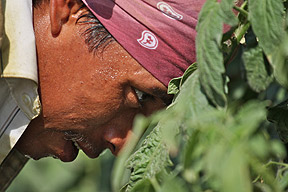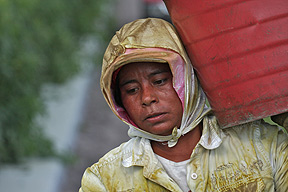Publix reverses course, says company’s no longer buying tomatoes from two Immokalee-based growers tainted by December, 2008, slavery prosecution.
So why aren’t we declaring victory?
Last week, Publix announced that it has suspended purchases from two Florida tomato growers associated with the latest slavery prosecution:
“The CIW chiefly seeks to stop Publix from doing business with two farms. Publix has already done exactly that!” (“Local group organizes big protest against Publix,” ABC News, Lakeland, FL, 4/8/10)
The oddly enthusiastic declaration comes after more than a year of continuing to purchase tomatoes from Six L’s and Pacific, the two farms referred to in the statement. For more than a year, Publix defended its decision to continue purchasing from the farms with non-sequiturs, saying it paid “market price” for the tomatoes and refused to get involved in its suppliers’ “labor disputes.” Publix’s inexplicable stand on slavery was roundly decried, most notably by the best-selling author, and sustainable food activist, Raj Patel, in an op/ed published in the St. Petersburg Times entitled, “Supermarkets must take stand against slave conditions for tomato pickers” (2/17/10).
The statement also comes just days before this week’s Farmworker Freedom March and in the wake of the highly-successful, six-week tour of the CIW’s Modern-Day Slavery Museum. As it criss-crossed the state this past month, the groundbreaking museum hosted visits from hundreds of Floridians every day and received wide coverage and strong support in the press. Likewise, all indications are that the Farmworker Freedom March will be the largest protest that Lakeland, Publix’s hometown, has ever seen.
After more than a year of turning a blind eye to human rights violations in its tomato supply chain, Florida’s largest supermarket chain is staring straight into a wave of public scrutiny that is cresting and ready to crash this week with the three-day march from Tampa to Lakeland. In this context, we’d like to take a closer look at Publix’s 11th-hour change of heart and why it is so clearly — by any credible measure of social responsibility — a classic case of “too little, too late.”
Too little…
The Publix statement begins, “The CIW chiefly seeks to stop Publix from doing business with two farms.” That’s just wrong, and it’s an almost absurd reduction of the demands that the CIW and tens of thousands of Publix’s own consumers have made abundantly clear for more than a year now.
Here — in bullet form, so there can be no confusion — is what the Campaign for Fair Food is in fact seeking from Publix:
- Penny-per-Pound Premium: Pay the same penny-per-pound premium that eight other retail food leaders are paying today, to help raise pickers’ wages above poverty level;
- Participatory Code of Conduct: Adopt the same code of conduct for their tomato suppliers that other retail leaders (most recently Aramark) have accepted, a code that was developed and implemented with worker participation;
- Humane Purchasing Policies: Commit to buying tomatoes from suppliers who agree to abide by that code of conduct, shifting purchases away from growers where abuses are discovered and toward growers trying to do better for their workers.
And here’s what we are not seeking from Publix: A one-off suspension of purchases of indefinite duration done solely to quell a surge of public criticism. But that is exactly what Publix appears to be doing.
 The Campaign for Fair Food is not about retailers making isolated forays into social responsibility only when public criticism spikes above a certain tolerable level. That’s what supermarket and restaurant chains have done for years, and while it may be an effective strategy to manage a temporary public relations crisis, it is inevitably reversed once the storm blows over and, ultimately, leaves no lasting improvements in the fields.
The Campaign for Fair Food is not about retailers making isolated forays into social responsibility only when public criticism spikes above a certain tolerable level. That’s what supermarket and restaurant chains have done for years, and while it may be an effective strategy to manage a temporary public relations crisis, it is inevitably reversed once the storm blows over and, ultimately, leaves no lasting improvements in the fields.
An analogous situation that recently made headlines is instructive: When ABC news discovered child labor in Michigan’s blueberry fields last October, Walmart, Kroger, and Meijer all suspended purchases from the farm involved:
“Walmart and two other supermarket chains said they were suspending dealings with Adkin Blue Ribbon Packing Co, the Michigan-based supplier at the heart of the latest scandal. Walmart will not buy anything from Adkin ‘pending the outcome of an investigation by our ethical sourcing team,’ a company spokesman said.” read more
But as even industry insiders know, walking away won’t change the underlying dynamics behind the very worst abuses in the fields today. The widely-read produce blog, the Perishable Pundit, had this to say on the blueberry example:
“These people get paid by the piece, so a little extra money from the kids working, for a family at this level, means a new pair of sneakers before school, a chance to go the dentist or maybe a little something in a Christmas stocking.
In all the anxiousness of retailers to distance themselves from this morally “shocking” activity, nobody stepped up to say the only thing that would really make a difference, which would be to pay more for blueberries…”
We couldn’t agree more. The only difference between the Walmart response to child labor in blueberries and the Publix response to slavery in tomatoes is that Publix wasn’t exactly “anxious” to distance itself from Six L’s and Pacific, dragging its feet for more than a year before finally feeling enough heat to pull out.
But instead of washing its hands of the abuses on Six L’s and Pacific’s tomato fields, Publix needs to step up and use its influence to help end those abuses once and for all. What the Campaign for Fair Food actually “chiefly seeks” from Publix is engagement, not disengagement.
What is the difference? Engagement is a constructive partnership among buyers, workers, and growers for more humane farm labor standards. It is the difference between having a supplier code of conduct that gathers dust somewhere in a basement office of the corporate headquarters — with no actual mechanisms for monitoring or enforcement — and collaboratively building a code of conduct that is clearly communicated to suppliers and enforced, with real market consequences, when it is violated. It is the difference between simply cutting purchases when abuses are discovered in a supplier’s operations and developing a corrective plan of action — together with farmworkers and growers — and encouraging growers to make the necessary changes by promising to resume purchases if they do.
It is the difference between a short-term public relations fix and a long-term commitment to higher standards.
That is what we are seeking from Publix. And that is why their decision to cut and run from Six L’s and Pacific — without committing to a broad set of standards that apply beyond this particular incident, and without articulating a clear and meaningful corrective path that would provide Six L’s and Pacific incentive to clean up their operations — is far too little if the goal is real social responsibility.
Too late…
We’ve already established that Publix’s move to cut-off Six L’s and Pacific came far too late to be considered an ethical decision — coming more than a year after the December, 2008, prosecution, and then only after months of untenable denial that the finding of enslaved laborers on a supplier’s farm should have any impact on their purchasing decisions.
Now here’s why that really matters.
As anyone involved in the industry will tell you, this is a pivotal moment in the history of the Florida tomato industry. The Campaign for Fair Food is quickly approaching a critical mass of Fair Food agreements, having secured the support of key leaders in the fast-food and foodservice industries as well as supermarket giant Whole Foods. At the same time, after two years of doing everything in its power to block our agreements from taking effect, the Florida Tomato Growers Exchange (FTGE) has blinked. After claiming that the agreements were illegal and threatening to fine any of its members that might agree to participate in the Fair Food program, the FTGE has abandoned that legally shaky ground and now says that is members are free to participate.
Thus, at the retail industry level the Campaign is steadily advancing, while organized resistance by the tomato industry as a whole has waned. We are nearing the tipping point, but a decisive challenge remains.
Today, the greatest obstacle facing the Campaign for Fair Food is at the level of the individual grower. East Coast Growers and Packers, Florida’s third largest tomato grower, bravely decided to break from the FTGE late last year and implement the Fair Food agreements. But no other large growers followed suit, due largely to fear of the unknown and the uncertainty that the participating buyers would in fact reward them with sufficient new purchases to justify the risk.
So, today, just as the Campaign for Fair Food is poised to turn this tremendous potential for change into real, concrete improvements in thousands of workers’ lives, individual growers remain hesitant, awaiting a clear sign from buyers that social responsibility is truly the way of the future.
And into this critical moment — into this breach between business as usual and change — stepped Publix. If any company could send the message to Florida growers that the era of buying tomatoes no-questions-asked is over, that the “Harvest of Shame” must finally come to an end, it would be Publix, the largest privately-owned business in Florida, a colossus in the food world.
 But rather than use its power to tip the balance toward greater farm labor justice, Publix shrugged.
But rather than use its power to tip the balance toward greater farm labor justice, Publix shrugged.
By refusing to join the growing partnership for Fair Food, Publix told fence-sitting growers that the time for social responsibility has not yet arrived.
By standing behind the very growers found to be using slave labor — after its competitor Whole Foods and other buyers took steps to sanction them and demand corrective action — Publix told those growers, and the rest of the tomato industry, that price alone drives its purchasing decisions, not ethical concerns.
By turning its back on human rights for so long, Publix discouraged growers from stepping up to the Campaign for Fair Food’s higher standards and so deferred justice for tens of thousands of Florida farmworkers.
Justice deferred is justice denied. And no amount of 11th hour public relations damage control can obscure that.
In the end, Publix’s decision to suspend purchases from Six L’s and Pacific is far too little, far too late. And so, we are not declaring victory. Instead, this April 16-18, we are marching — to demand a real, enduring commitment to justice from Publix. And we will not stop until we achieve it.
***
UPDATE: Since this page was originally posted, Pacific Tomato Growers has agreed to participate in CIW’s Campaign for Fair Food and has adopted a comprehensive Code of Conduct that affords significant verifiable worker protections. This Code reconfirms Pacific Tomato Grower’s long-standing commitment to a zero tolerance for forced labor. While Pacific Tomato Growers was never the target or subject of the Federal prosecution’s Navarrette investigation, Pacific Tomato Growers agrees that all growers must do more to prevent the use of forced labor on their farms.
